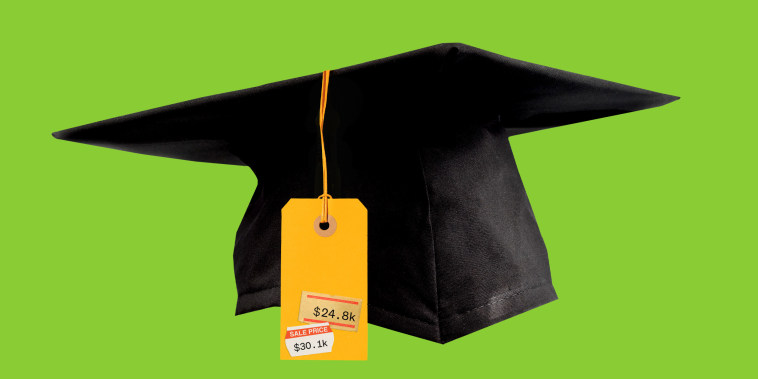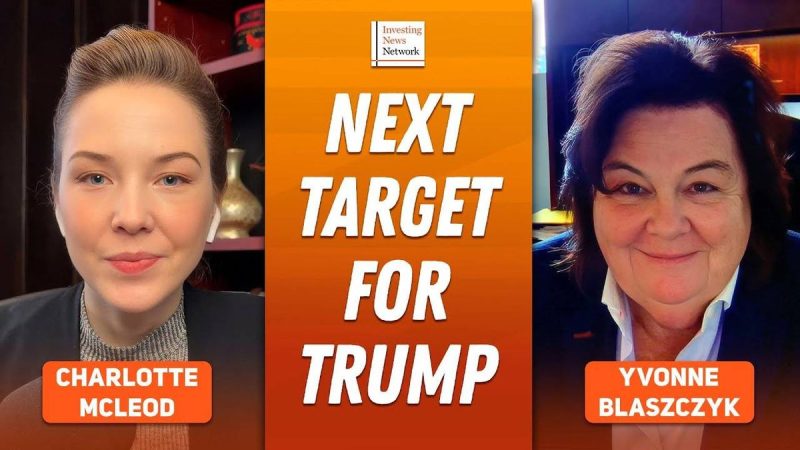As student loan payments loom, borrowers weigh deferrals, ‘debt strikes’ and Deuteronomy


Student borrowers are floating a range of ideas online for lightening their burdens when loan repayments resume on Oct. 1: Pay a little, pay nothing, cite Scripture.
In a recent viral TikTok with over 50,000 likes, Dawn Cowle discusses a letter she sent to Nelnet, her student loan issuer, featuring a verse from the Book of Deuteronomy: “At the end of every seven years you must cancel debts.”
Cowle acknowledged she was joking — mostly.
“It would be ridiculous if Nelnet was like, ‘Oh, OK, sure, no questions asked. You can’t pay your loans back? You got it!’” she said.
But like many indebted borrowers, she’s had frustrations to vent since June 30, when the Supreme Court invalidated President Joe Biden’s plan to cancel up to $20,000 in student debt per eligible borrower.
Throwing the Bible at Nelnet, Cowle said, “would show that we are not in a position to just continue to lay down and be steamrolled.” (Nelnet didn’t respond to a request for comment.)
Sentiments like Cowle’s have reanimated a vocal online community of borrowers and activists, some of whom have long campaigned for government debt relief or, failing that, a mass boycott of student loan repayments. But experts — and some borrowers who’ve tried it — warn that most people risk serious consequences for not ponying up.
“The financial repercussions of not paying your student loans, to me, is probably one of the worst financial decisions that you can make as an individual,” said Robert Farrington, the founder of the College Investor, which works to improve young people’s financial literacy.
Nonpayment, especially for those with loans from the federal government, could lead the authorities to garnish borrowers’ tax refunds, or their Social Security or disability payments, he said. It can also limit access to more student aid in the future and even hinder employment.
Not paying your student loans, to me, is probably one of the worst financial decisions that you can make.
Robert Farrington, founder of the College Investor
“It’s not new,” Farrington said about the idea of deliberate nonpayment, “but I think because now payments are resuming, it’s definitely getting a lot more traction.”
Over 45 million Americans hold more than $1.7 trillion in federal student loans, with the average borrower owing over $37,000, according to the Education Data Initiative. Most student debt is federal, with only 8% of students borrowing from private issuers.
Shahem Mclaurin, a TikTok creator with over half a million followers, asked viewers in a recent viral video whether people will begin paying back their loans after the Supreme Court rejected Biden’s plan.
“And this is not a joking, play-play-like type of situation,” Mclaurin said. “Are we not paying — like collectively, as a whole — meaning if you put a payment down you are breaking, you’re crossing the line?”
Thousands of comments and “stitches,” where TikTok users incorporate existing posts into their own, weighed in on Mclaurin’s idea. The first-generation college graduate earned a master’s degree from NYU in 2020, owes $150,000 and doesn’t plan on paying any of it back soon, citing the high costs of living.
“I worry every day,” Mclaurin said of the possible repercussions. “Sometimes I don’t sleep at night. I have a lot of anxiety around it.”
After the Supreme Court ruling, the Biden administration unveiled a yearlong grace period starting this fall, insulating borrowers from near-term consequences for nonpayment even while interest begins to accrue again starting Sept. 1. And under longstanding federal policies, borrowers with existing student debt can typically get their payments paused temporarily if they go back to school. In many cases, though, interest will continue to accrue.
Cowle said her loans are deferred for now as she works on her MFA in screenwriting; payments will kick in six months after she graduates a couple of years from now. While she said she didn’t pursue another degree as a deferment strategy, some are saying they will.
Dominic McDonald, a May 2022 graduate of Albion College in Michigan, said the ruling expedited his decision to apply for graduate school this year to avoid paying his loans. “I am under some financial stress because I’ve never had to do it before,” he said.
There are ways to pay less through other avenues that don’t entail potential penalties, Farrington said. He estimates that half of student loan borrowers qualify for some type of forgiveness program, but many haven’t filed the paperwork to receive it.
“People are just leaving loan forgiveness money on the table that they should qualify for,” he said.
The Debt Collective, an organization founded in 2012 alongside the Occupy Wall Street movement, has been promoting a “Can’t Pay! Won’t Pay! Student Debt Strike” on its website and offering advice about “the multiple ways you can safely get to nonpayment.”
Those include income-driven repayment plans, which adjust monthly payments to a borrower’s income, and public service loan forgiveness, which allows people working in government and other civic-oriented jobs to have their debts zeroed out. Farrington also encourages these methods, among others, and hopes more people will pursue them.
Even if [the monthly payment] is a couple hundred dollars, I need it.
student borrower Josie Bridges
After the Supreme Court ruling, “We internally are like, ‘Oh wow, we need to prepare for this influx of people,’” said Braxton Brewington, the Debt Collective’s press secretary. He said the group has seen interest in its debt strike jump in recent weeks and expects it to rise further as Oct. 1 nears.
Asked whether the collective worries its messaging could be misinterpreted as a call to simply boycott repayments indefinitely, Brewington said the organization encourages people to avoid defaulting on their loans if they can help it. But he said the group aims to highlight the tough financial predicament many borrowers face.
“What’s blanketed the whole conversation about ‘Should people just not pay?’ is people don’t want to be subjected to the harsh consequences of the federal government,” he said, adding that the Debt Collective urges borrowers to use their money on necessities like food, medication or housing over paying back their loans. “In a lot of ways, there isn’t a choice,” he said.
Some borrowers are warning others online against nonpayment, with a few saying they’d had their wages garnished. Other efforts are popping up to offer cash-strapped debt-holders informal or crowdsourced support through community funds and mutual aid. One TikTok user has even floated creating a lottery system to help pay off random people’s student loans every week.
Josie Bridges, a single mother in Portland, Oregon, said she was eligible to have all of her student loans forgiven under the White House plan. Now, between rent and other basic expenses, she said she couldn’t afford to resume payments this fall even if she wanted to.
“Even if [the monthly payment] is a couple hundred dollars, I need it,” she said.
Bridges is watching the calendar tick down to October with trepidation. She’s even considering picking up a couple new classes — and racking up more debt in the process — just to defer the coming payments.
“Now that they’re back, I’m stressed out,” she said.



